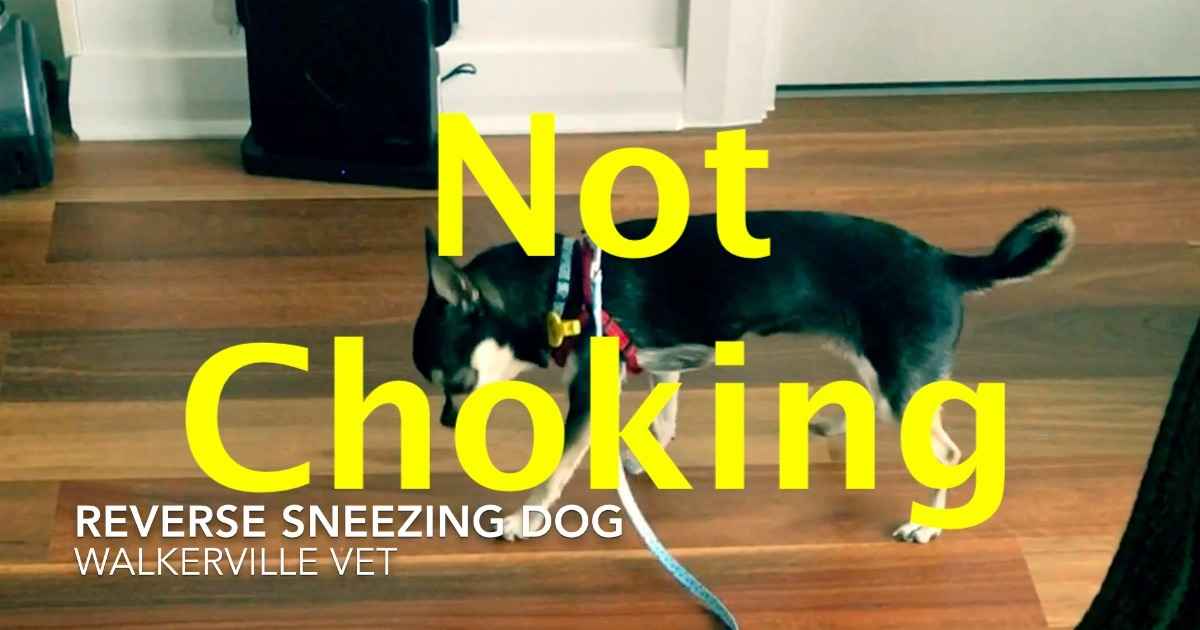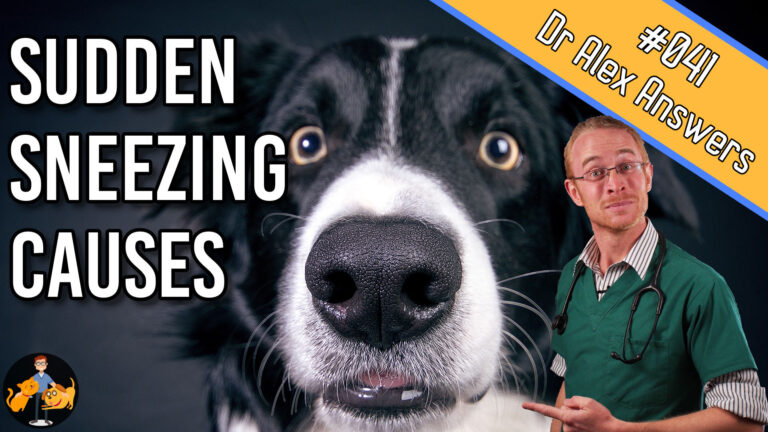If your dog is suddenly sneezing excessively, it could be due to allergies, foreign objects stuck in their nose, or an infection. It’s important to monitor their behavior and contact a vet if the sneezing persists or is accompanied by other symptoms.
Pets can develop sudden sneezing for various reasons, such as exposure to irritants like pollen or dust, or a nasal infection. While occasional sneezing is normal, persistent sneezing or other symptoms could indicate a more serious issue. Observing any changes in your dog’s behavior and seeking professional advice can help identify and address the underlying cause of their sudden sneezing.
This will ensure they receive appropriate care and treatment to alleviate their discomfort.
Allergies And Environmental Irritants
Common allergens that affect dogs: Dogs can be affected by a variety of common allergens, including pollen, dust mites, mold, and certain foods. Identifying the specific allergen affecting your dog can be crucial in managing their symptoms effectively.
Seasonal versus household allergies: Understanding whether your dog’s allergies are seasonal or caused by household irritants can help in determining the best course of action. Seasonal allergies are often triggered by pollen, while household allergies may be caused by dust mites, mold, or certain cleaning products.
Immediate environment assessment: Conducting a thorough assessment of your dog’s immediate environment can help identify potential sources of allergens. This may involve evaluating their living space, grooming products, and any recent changes in their surroundings that could be contributing to their symptoms.
Infectious Causes To Consider
My dog won’t stop sneezing all of a sudden. There are several infectious causes to consider when a dog exhibits sudden and persistent sneezing. Viral infections, such as canine distemper and parainfluenza, can lead to respiratory issues and excessive sneezing. Bacterial infections, particularly those affecting the upper respiratory tract, can also provoke sneezing in dogs. Additionally, fungal infections, especially those affecting the nasal passages, may result in persistent sneezing.
Unmasking Behavioral And Stress-induced Sneezing
Dogs can experience stress-induced sneezing, which may manifest suddenly and persistently. It’s essential to differentiate between play sneezing and health concerns. Play sneezing is a common, harmless behavior that occurs during excitement or play. On the other hand, sudden and frequent sneezing could indicate a health issue such as allergies or respiratory infections.
Anatomical And Foreign Objects
Investigating foreign body obstruction: If your dog is suddenly experiencing frequent sneezing, it may be due to a foreign object lodged in their nasal passage. Common signs include pawing at the face, nasal discharge, and persistent sneezing. Consulting a veterinarian for a thorough examination and potential imaging to identify any obstructions is crucial for prompt treatment. Addressing foreign body obstructions promptly can prevent further complications.
Anatomical and foreign objects: Understanding your dog’s nasal structure and breed-specific sneezing tendencies is vital. Certain breeds are predisposed to anatomical conditions that may cause sneezing. Moreover, being aware of the common foreign objects that could potentially obstruct your dog’s nasal passage helps in identifying the possible causes of sudden sneezing.
Reaction To Medication Or Supplements
Side effects: Certain medications or supplements can induce sudden sneezing as an adverse reaction. Common canine drugs such as antibiotics and antihistamines may lead to this symptom. If your dog is currently on medication, consult your veterinarian to evaluate potential side effects.
Allergies: Food allergies, particularly to ingredients such as wheat, soy, or dairy, can trigger excessive sneezing in dogs. Assessing your pet’s diet and identifying potential allergens may help alleviate the issue. Consider switching to a grain-free or limited ingredient diet to minimize allergic reactions and subsequent sneezing episodes.

Credit: www.walkervillevet.com.au
Exposure To Cleaning Products And Toxins
Exposure to Cleaning Products and Toxins can lead to sudden and persistent sneezing in dogs. Household chemicals such as cleaning products, air fresheners, and pesticides may irritate the nasal passages of dogs, resulting in excessive sneezing. Additionally, outdoor toxins like pollen, mold, and dust can also trigger sudden sneezing episodes in dogs. It is important to be mindful of the substances your dog may come into contact with to potentially prevent these sneezing issues and maintain their overall health and well-being.
When To Visit The Vet
My dog won’t stop sneezing all of a sudden, and it’s important to recognize signs for medical intervention. If your dog’s sneezing persists or is accompanied by other concerning symptoms such as nasal discharge, coughing, or labored breathing, it’s advisable to visit the vet. Diagnostic tests and procedures may be necessary to determine the underlying cause of the sneezing. A vet can conduct a thorough examination to assess your dog’s overall health and recommend appropriate treatment. Keep an eye on any changes in behavior or appetite and seek professional advice promptly to ensure the well-being of your furry companion.
Home Care Strategies
If your dog is experiencing sudden sneezing, it’s important to provide soothing remedies to help alleviate discomfort. steam showers or humidifiers can help maintain an optimal level of humidity in your home, which can help your dog breathe more easily. Keep your pet away from potential irritants, such as strong odors or smoke. Be sure to observe environmental adjustments that could potentially contribute to your dog’s discomfort, such as exposure to pollen, dust, or household chemicals. Consider consulting with a veterinarian to rule out any underlying health issues and to seek guidance on how to support your dog’s recovery.
Long-term Health And Prevention
Regular vaccinations play a crucial role in maintaining your dog’s long-term health. By strengthening the immune system, vaccinations help prevent the onset of various diseases and illnesses. Building up your dog’s immune defense through proper vaccinations can significantly reduce the risk of sudden health issues such as excessive sneezing. However, it’s important to consult with your veterinarian to ensure your dog’s vaccination schedule is up to date and tailored to their specific needs.
Frequently Asked Questions For My Dog Won’t Stop Sneezing All Of A Sudden
Why Is My Dog Suddenly Sneezing A Lot?
Sudden increase in sneezing could indicate allergies, irritants, or infections. Monitor for any other symptoms and consult a vet if the sneezing persists or if your dog seems unwell.
What Are Common Causes Of Sudden Sneezing In Dogs?
Common causes include allergies to pollen, dust, or mold, irritants such as strong scents or smoke, or infections like kennel cough. Consult a vet for a proper diagnosis.
How Can I Help Relieve My Dog’s Sudden Sneezing?
Keep the environment clean, minimize exposure to potential allergens, and consult a veterinarian for recommendations on possible treatments or medications to alleviate your dog’s sneezing.
When Should I Be Concerned About My Dog’s Sudden Sneezing?
If the sneezing is accompanied by other symptoms like coughing, discharge from the nose or eyes, or if your dog seems lethargic or unwell, it’s best to seek prompt veterinary attention.
Conclusion
It’s important to monitor your dog’s sudden sneezing and seek veterinary attention if necessary. Consider potential triggers like allergies, irritants, or infections. Remember to keep your dog’s living environment clean and minimize potential allergens. Always consult a professional to ensure your dog’s health and well-being.
Stay informed and attentive to your furry friend’s health.



